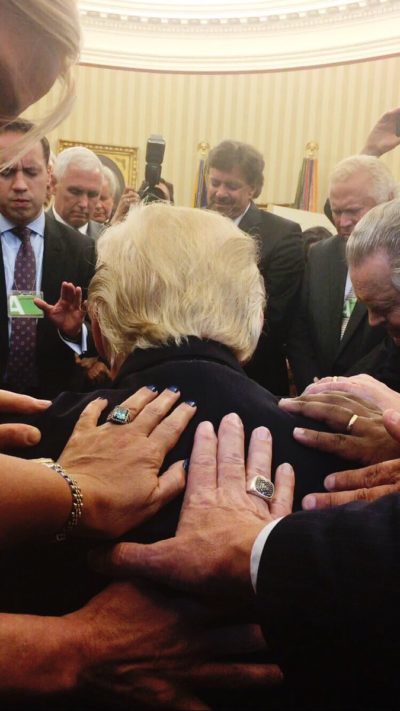Revoice is a new organization composed of people who seek “to encourage, support, and empower gay, lesbian, and other same-sex attracted Christians so they can experience the life-giving character of the historic, Christian sexual ethic.” The group encourages same-sex attracted people to be open about their orientation in traditional church but to remain celibate.
Despite the emphasis on celibacy, they are open about their experiences and they reject efforts to change orientation. They also openly describe themselves as gay, lesbian, bisexual, or transgender.
Revoice has scheduled a conference in late July that has generated some controversy, especially among those restless reformed folk who brought us the Nashville Statement.
A quick critic of the conference has emerged in Owen Strachan. In a post at the Center for Public Theology, Strachan begins with a case study of a divorced couple who parted ways over the husband’s homosexuality. He suggests that Revoice will teach things that lead to such divorces. Strachan then offers his own answers which he claims lead to hope.
The Rest of Many Stories
Strachan tells us that a person dealing with same-sex attraction is “not a special case.” He adds that the “key to victory in this area” is “understanding this, and rejecting the now-common spirit of victimhood.” Strachan assures the reader that Jesus is bigger than “any attraction, any lust, any unbiblical identity. ”
Without contesting his theological rhetoric at this point, I think it is only fair to offer some contrasting vignettes to his story. In fact, I suspect Revoice has emerged because the approach that Strachan advocates hasn’t worked very well. This is the practical problem for those who criticize Revoice. Despite the theological precision, there is a long history of damage which cannot be denied.
Ex-Gay History
I have been researching and counseling same-sex attracted evangelicals since 1998. Initially, I defended reorientation therapy and ex-gay ministries. Yet, after much clinical experience and a reevaluation of the evidence, I changed my views. Here are just a few vignettes and points which should make Rev. Strachan reconsider his confident critique of Revoice. The men below once advocated an approach to victory over what they once considered sin which is very much like what Strachan wrote about in his critique of Revoice.
Michael Bussee
One of the founders of Exodus International, Michael Bussee and his eventual lover Gary Cooper left Exodus when they admitted to each other that they hadn’t changed orientation. They had been advised by their Christian ministry to believe God was giving them victory over their temptations but the victory never came.
John Paulk
The founder of Focus on the Family’s Love Won Out program, John Paulk was described by Christianity Today as the “poster boy” for the ex-gay movement. He was photographed in a gay bar while leading the movement and then after he left FOTF in 2003, he later divorced his wife Anne in 2013 and came out again as gay.
John Smid
John Smid was the director of Love in Action in Memphis TN, one of the flagship ministries of Exodus International. LIA was very much geared toward avoiding temptation, the appearance of evil, mortification of the flesh and generally following the kind of advice articulated by Strachen. However, sometime after Exodus closed down in 2013, Smid and his wife divorced and he later married a man.
Randy Thomas
Randy Thomas was for many years a leader in Exodus International and was Vice-President at the time it closed. Exodus rejected identity labels like gay or lesbian. While with Exodua, Thomas spoke to groups and exhorted them to victory over the flesh with slogans like “the opposite of homosexuality is not heterosexuality but holiness.” Five years after the closing of Exodus, Randy is out as bisexual and in a same-sex relationship.
I could go on. There are many such stories. I also know people who manage to adhere to their traditional views. Some go along with Strachan’s views whereas more lean toward Revoice’s approach.
Get Real
Like so many from the Exodus International era, Strachan throws out theological language which sounds hopeful in theory but doesn’t work out so well in practice when applied to LGBT people. Comparing sexual orientation to greed or anger just shows how little one understands about the subject and the real people involved.
Strachan has every right to advocate for his theological understanding of sexual orientation. However, my objection is the rhetoric which promises victory, without defining what that means. When I read that Jesus is “bigger” than something, I think He is going to conquer it or take it away. When I read victory, I think actual winning.
Strachan then promises that his way is better than Revoice’s way. Reality and experience say otherwise. This is a real problem which he doesn’t confront. Maybe he doesn’t know enough GLBT people to know it is a problem. But it is definitely is a problem because in actual practice, real people infrequently get the results promised by the rhetoric used in the article.
Instead of criticizing his brothers and sisters, perhaps Strachan should work on making his own message a little clearer. Tell his readers that people rarely change and that there are just as many failures as he defines them using his method as use the others he dislikes. That would at least be more honest.
People who want to remain traditional in their actions have a hard enough time without being severely criticized by those who are, in many ways, ideologically similar. Indeed, it might be that exclusionary attitude that makes progressives look attractive.

